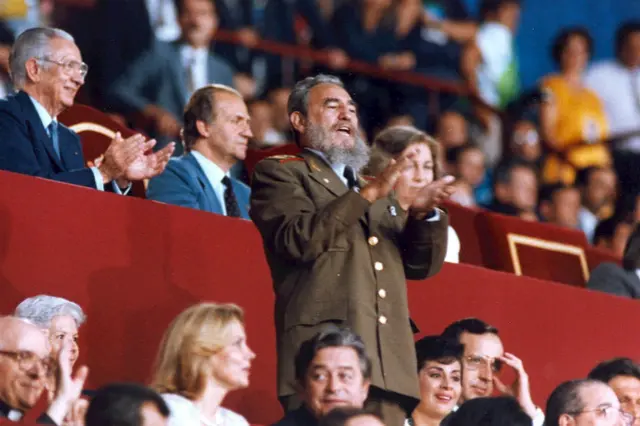Few foreign leaders have been more endearing to Chinese people than Fidel Castro, the charismatic Cuban revolutionary whose death at age 90 late Friday has prompted condolences and commendations from the blogosphere and Beijing leadership.
Calling him "a great figure of our times", President Xi Jinping said Castro's death meant the Chinese people had lost a close comrade and sincere friend.
"His glorious image and great achievements will go down in history," said Xi, who visited with the man known to most Cubans as "El Comandante" — the commander — in 2011 and 2014.
Fidel Castro, on his first trip to China, visits the Great Wall in Beijing on Dec 1, 1995. Photo: China Daily
"The great comrade Fidel Castro will be forever remembered," Xi said on Saturday.
Premier Li Keqiang, who had talked with Castro in Havana on Sept 25, also lavished him with praise.
In his message of condolence to Cuban leader Raul Castro, Fidel Castro's brother, Li hailed the elder Castro as "the founder, defender and propeller of China-Cuba ties".
Fidel Castro led Cuba for nearly half a century before stepping down for health reasons in 2006, when he passed the baton to his brother.
Li said China stands ready to inherit and carry forward the traditional friendship between the two countries.
State broadcaster China Central Television aired a documentary hours after Castro died, showing an impassioned figure asking a huge gathering at Havana's Revolution Square on Sept 2, 1960, if the Cuban people would like to establish diplomatic relations with the People's Republic of China.
The crowd's positive response was overwhelming.
In 26 days, Cuba became the first nation in the Western Hemisphere to forge diplomatic relationship with New China.
"Many of the older generation of Chinese live with a nostalgic, sweet memory of singing the lyrics to Beautiful Havana and tasting Cuban sugar," according to the documentary.
Zhang Tuo, Chinese ambassador to Cuba, said, "Both the Chinese and Cuban sides expect to translate their good political relations into fruitful pragmatic cooperation, and usher in a mutually beneficial partnership at a new stage."
For decades, Castro impressed generations of Chinese people with a mix of charisma and iron will in, for half a century, defying the United States and unwaveringly committing Cuba to socialism.
Pictures or artifacts depicting Castro as a tall, bearded man, wearing a green military uniform, and puffing his trademark Cohiba cigars, could be found in many Chinese households.
Several of his books, including his 1,000-page memoir Fidel Castro Ruz: Guerrilla of Time, have been translated into Chinese.
Stories based on Castro's legendary status, including his survival after numerous assassination attempts and his relations with late Chinese leader Mao Zedong, have been told and retold in China. Often, with each retelling, Castro's status and deeds would grow.
When leading a guerrilla force in the rugged Sierra Maestra mountains in the late 1950s, Castro was widely believed to have read and drawn inspiration from On Protracted War, a monumental work drawn from speeches Mao gave in 1938 to guide China in defeating the invading Japanese army.
Although a report said Castro hadn't read the book until the 1960s, after Cuban dictator Fulgencio Batista was overthrown, Xu Yicong, a former Chinese ambassador to Cuba, said Castro had told him that Mao's thoughts, especially his military strategies, had influenced him in the course of leading the Cuban armed struggle.
Ernesto "Che" Guevara, one of Castro's closest comrades in the revolution, told Mao in Beijing in 1960, "Your ideas about guerilla warfare have guided us to victory."
Castro said he always wished he had also met Mao in person. He once sent the gift of a pistol to Mao, with Mao's name inscribed on it. Nearly two decades after Mao passed away in 1976, Castro paid a tribune to Mao at his memorial in December 1995, when he first visited China.
Xu remembered Castro scaled the Great Wall and tasted roast duck and also liked China's sweet-osmanthus flavored wine.
Castro visited China again in February 2003, when he learned about China's socialist market system and the reform of State-owned firms from then-premier Zhu Rongji.
In 2004, Castro was seen singing The East Is Red, one of the most popular Chinese songs linked to Mao, on Cuban television.
Liu Yuqin, Chinese ambassador to Cuba between February 2010 and January 2012, said: "I think he was indeed a great leader. Even when he was retired, at such an advanced age and with compromised health, what he thought about was how to improve the well-being of his people."
(CHINA DAILY)
 简体中文
简体中文

